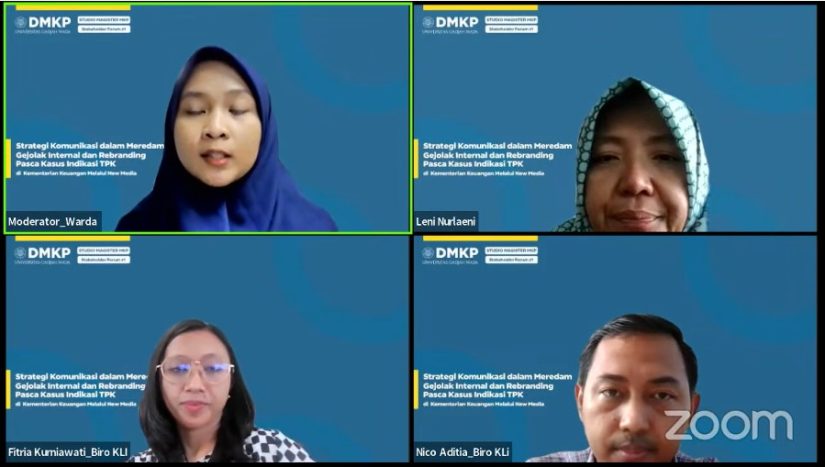
Yogyakarta, May 4th 2023─The Department of Public Policy Management of the Faculty of Social and Political Sciences of Universitas Gadjah Mada (DMKP Fisipol UGM) held a Stakeholder Forum entitled “Communication Strategy in Mitigating Internal Turmoil and Rebranding of the Post-Corruption Indication in the Ministry of Finance through New Media” on Thursday (4/5) via Zoom Meetings. In the first series of the forum, DMKP presented a number of speakers and speakers from the Ministry of Finance (Ministry of Finance), namely Leni Nurlaeni, Head of the Communications Strategy Management of the KLI Bureau, Ministry of Finance; Nico Aditia, Head of Research and Audit Subdivision of the KLI Bureau, Ministry of Finance; and Fitria Kurniawati, the Acting Head of Electronic Publications Subdivision of the KLI Bureau, Ministry of Finance; and moderated by Wardatur Masykuroh, Master student of DMKP Fisipol UGM.
Lately, the Ministry of Finance has been busy with indications of Corruption Crimes (TPK). The indications of this case shocked the public, creating a stir, even for the internal of the Ministry of Finance as well. In response to this, this forum was held to review the communication strategy adopted by the Ministry of Finance in dealing with the crisis in order to restore public trust and create a conducive atmosphere within the Ministry of Finance’s internal work environment.
Leni said that the current crisis is a repetition of what has happened before. However, there is a significant New Media factor that causes the issue to develop very quickly and receive wide attention. “We respond quickly, precisely, and completely to all issues,” said Leni when explaining the principles that were used in the Ministry of Finance’s communication strategy. In addition, the communication strategy also uses collaborative principles because it does not only involve the Ministry of Finance’s communications team, but all divisions, even the Minister of Finance of the Republic of Indonesia, Sri Mulyani, also gives directions regarding the crisis communication strategy that must be carried out.
There are several actions taken by the Ministry of Finance in an effort to deal with the crisis. In terms of crisis communication, Nico said that the Ministry of Finance’s response included press conferences, press releases, clarification of inaccurate statements in the media, activation of social media, and activation of employee advocacy by involving the Ministry of Finance staff. Nico considers that the efforts have succeeded in reducing negative sentiment which was circulating on social media. However, Nico also stressed that this did not mean the issue was over. Therefore, the Ministry of Finance will continue to make efforts to keep the issue from developing. In addition, the Ministry of Finance will continue to improve internal communication and pay attention to stakeholder expectations.
Furthermore, Fitria explained the management of the Ministry of Finance’s social media, which so far carries the message “The Ministry of Finance is Trusted”. Fitria also said that the narrative that was built during the crisis included the Ministry of Finance’s firm stance, explanations, and facts related to the case, the benefits of the state budget and the Ministry of Finance’s services that have been felt by the public. This was not only conveyed by one party, but through social media accounts of the Ministry of Finance of the Republic of Indonesia institutions, Key Opinion Leaders such as Sri Mulyani and Yustinus Prastowo (Staff of the Minister of Finance for Strategic Communication), the Echelon 1 Units, employee advocacy, and even working with other ministries.
